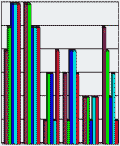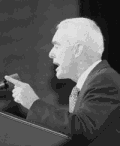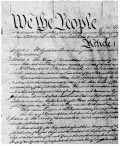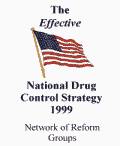
| Is Truth a Casualty of the Drug War? | ||
|---|---|---|
The advertisements below from 1999 focus on misinformation in the drug war. Ads from 2000 and 2001 are available here, and click here to view more recent ads from 2002 to present. The Common Sense public information campaign carefully quotes credible research and leading authorities so as to provide the public with reliable information and to better inform the debate on drug policy. | ||
16. "It is time to admit the war on drugs has failed" is an open letter, signed by a wide-range of public interest organizations, which was sent to Congress as part of a series of spending recommendations. This ad is also available in printer-ready Portable Document Format (PDF). The entire set of appropriations recommendations can be reviewed by clicking here. |  | |
15. "Mandatory Sentencing is Bad" quotes Supreme Court Justice Breyer, ONDCP Director Barry McCaffrey and Joseph Califano on mandatory sentencing. These strong supporters of America's drug war feel that the mandatory sentencing regime should be abolished. Available in printer-ready Portable Document Format (PDF). |  | |
14. "Controlled Access to Heroin" explains the result of the Swiss national vote to continue allowing medical doctors to prescribe heroin to heavily addicted people. Research shows that people who do not respond to abstinence or methadone programs can successfully control their addiction to heroin if they are prescribed small, maintenance doses of the drug, while undergoing counseling & therapy. Crime, poverty and homelessness all descreased for people in this program. Available in printer-ready Portable Document Format (PDF). |  | |
13. "Do our drug laws focus on the truly dangerous drugs?" first appeared in The New Republic on September 13, 1999. The ad compares the danger of various popular drugs - based on data developed by Dr. Jack Henningdield for NIDA. Available in printer-ready Portable Document Format (PDF). |  | |
12. "Arizona Stops Jailing Drug Users" appeared in the June 28, 1999 edition of The New Republic and the July 26, 1999 edition of National Review. The ad focuses on an Arizona Supreme Court study of the Arizona Drug Medicalization, Prevention and Control Act of 1996. This act mandated treatment instead of jail time for non-violent drug use offenses. Available in printer-ready Portable Document Format (PDF). |  | |
11. "We are deeply troubled" first appeared in the New Republic in March of 1999. The ad reproduces an open letter that criticizes ONDCP Director Barry McCaffrey for for his continued mischaracterization of information relating to needle exchange programs, medical marijuana, and Dutch drug policy. The letter attracted media and public attention for its high-profile signatories, which included public officials, minority rights activists, professors and public health experts. Available in printer-ready Portable Document Format (PDF). |  | |
10. "A Police View on the War on Drugs" appeared in the New Republic and the National Review in 1999. Statement of Chief Hubert Williams, President, Police Foundation, March 25, 1999 |  | |
9. "Dutch drug policy even more effective than previously thought!" appeared in the New Republic in 1999. The ad is a follow-up to a previous ad on the successful Dutch drug control model and reflects more recent research. |  | |
8. "Treatment is more effective than law enforcement" appeared in The New Republic in 1999. The ad summarizes research conducted by the respected RAND Drug Policy Research Center. |  | |
7. "It's as simple as 1, 2, 3" appeared in The New Republic and the National Review in 1999. The ad points out three important facts on marijuana and succinctly raises the question, "How can we justify the war on marijuana?" |  | |
6. "Has the Drug Czar Bought the Media for a Billion Dollars?" In the Fall of 1998, McCaffrey challenged Magazine Publishers of America (MPA) to use their editorial boards to write articles supportive of the ONDCP's "War on Drugs." Perhaps motivated by a fear of losing a slice of a recently enacted $1 billion advertising pie, the MPA accepted McCaffrey's challenge. McCaffrey's actions represent an unprecedented attempt by a government agency to use tax dollars in order to sway journalists and editorial boards. |  | |
5. "Compromising Integrity and Prestige?" The Center on Addiction and Substance Abuse is one of the leading drug war think tanks in the United States. Its' director, Joeseph Califano is often quoted without any critical comment. Columbia University provides CASA with a university affiliation which adds to CASA's credibility. The purpose of this ad is to highlight that academics question the accuracy of CASA data, the reports of CASA are not based on scientific analysis and their reports are not peer-reviewed. |  | |
4. "A Victim of the Drug War?" appeared in The New Republic in 1998 and again in Reason Magazine in 1999. This ad illustrates how our Constitutional rights and freedoms are being gradually eroded by the war on drugs. |  | |
3. "Marijuana Myths/Marijuana Facts" appeared in The New Republic in 1998 and in the National Review in 1999. The ad repeats five common marijuana myths and rebuts them with the facts. |  | |
2. "Dutch Drug Policy Works" appeared in the November 2, 1998 issue of The New Republic. The ad compares the US and Holland on some of the key indicators on the effectiveness of drug policy. The comparisons are based on official statistics of the US and Dutch governments. Not surprisingly in every category Holland is better off than the United States. |  | |
1. "Pinocchio McCaffrey" appeared in the October 5, 1998 issue of The New Republic. It features General McCaffrey as Pinocchio and reviews his statements on drug policy in six areas. The drawing in the ad was prepared by activist John Wilson. |  | |
"The Effective National Drug Control Policy" appeared in the National Review and the New Republic in 1999. This four page ad summarized the first comprehensive alternative to the "War on Drugs". It is presented here in printable PDF format which requires a PDF viewer. |  | |
|
Common Sense for Drug Policy
1377-C Spencer Ave. Lancaster, PA 17603 717-299-0600 (phone) 717-393-4953 (fax) info@csdp.org |
| |
Copyright © 2001-2023,
Common Sense for Drug Policy
Accessed: [an error occurred while processing this directive] times